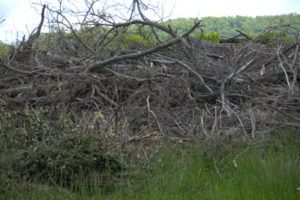Vol. 4 Issue 1, Winter 1998/1999
By Joe Coleman
 Woodsman, spare that brush!
Woodsman, spare that brush!
Small creatures need it for food and shelter.
It has never in the history of the world been easier, with our new electric and gas-driven tools, to cut down a natural habitat.
Many people have told me recently that they’ve seen more and more hedgerows being torn out, meadows subdued into lawns, and homeowners not only mowing clear down to their streams but tearing out the vegetation around the streams.
People wonder, with reason, what this means for the wildlife, especially in a serious drought year like this one, with fruit- and berry-producing trees and shrubs not producing and a dry winter predicted.
Many animals depend on these habitats for food and shelter, and without them our wildlife, with whom we share the land, will suffer hard times. Perhaps few people realize that these unshaven areas also protect us. Lawns not only don’t serve as buffers for our streams, they and their maintenance actually make matters worse. And while the absence of rain these past months has helped us forget the impact of erosion, a healthy buffer of shrubs and trees along a stream minimizes the erosion and chemical run-off that damage both our immediate neighborhood and the tributaries of the challenged Chesapeake Bay.
Hedgerows and Other Corners of Diversity is an important pamphlet available from the Piedmont Chapter of the Virginia Native Plant Society. Among the more general concerns, it points out that as we shave away their natural food and shelter, the wildlife moves into our yards and even our homes in search of food and shelter.
The tangle of trees, briars, and shrubs along the edge of your lane and your property may not meet your standards of suburban tidiness, but it will grow on you if you spend some time watching the activity that takes place in it and the flowers and foliage – and delicious warm summer berries – that flourish in it, and the animals that depend on it. Smaller animals provide food for larger animals and the soaring hawks and owls that share our land with us. A country lane without a hedgerow is a sterile place indeed.
In Levittown, a close-shaven lawn is a status symbol. In the country, a flourishing population of birds, berries, bunnies, and bushes seems more appropriate. Just because it’s easy to strip the land doesn’t mean it’s good.

